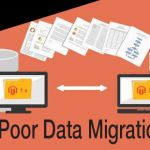
Impact of Poor Data Quality in Healthcare Business
Introduction
Data is one of the most used buzz words in the 21st century. It plays a crucial role in any business for improvising sales targets, optimize business operations & drive innovation. With growing trends to incorporate modern technology for business, healthcare is one of the sectors which have shown a tremendous increase in adopting new technology in recent years. Similarly adapting the latest technology leads to high dependence on the accuracy and quality of data being used in business. Hence improving the data quality in healthcare begins by understanding the core demands of data quality management.
“Data-driven decision making is understood & appreciated. However, the quality and application of it needs to mature inconsistency”- Adrian McKnight
What Is Data Quality Management?

Data is considered a core component of every business. Data quality management has a set of procedures & technologies that integrate various trusted data sources for effective integration & collaboration which safely removes duplicate & redundant data while securing sensitive customer information for the business.
We know how poor data can leave a tangible impact on people’s lives, hence electronic healthcare records or reports are strictly governed by rules & regulations of HIPPA & policies. Having high-quality data in clinical healthcare databases is one of the key essentials for offering quality patient care.
Why data quality is crucial healthcare industry?

Quality without science & research is absurd. You can’t make inferences that something works when you have 60% of missing data – Peter Pronovost
Many healthcare organizations sourced data from many quality sources to build long-term business processes in a structured manner. With quality data, you can speed up existing processes& build new learning through smarter policies. Having clean health records & datasets can additionally add up value to your business. This is helpful for different teams to use collated data & gain insights out of it. Therefore the impact of quality data management is highly used for performance analysis.
So here we will discuss why data quality is important in the healthcare industry, its challenges, and limitations and take appropriate actions to improve the quality of the database for your business.
Poor quality data can harm your business seriously, which leads to inaccurate analysis that results in poor business decisions. This poor decision-making can leave a tremendous effect on how a business performs.
Major causes of Poor Data Quality:
Data Decay:

We all know that data is dynamic. It is estimated that around 40% of the people change their postal address & 15% change their email address manually. Hence it is important to stay top over competitors when it comes to healthcare marketing data. You’re supposed to waste your money & resource if you’re using outdated data for a business campaign.
Poor Data Migration:

Framing a proper migration strategy is important for any business. Data values can be irregular, missing, misplaced, or more. So if your data is clean you don’t have any problem else you need rules to implement strategy & clean data.
Data Sharing & Monitoring:

If you’re building the healthcare email database for business, then you must make sure there is no ambiguous data in it. Bringing up data to standard will not guarantee higher quality. Hence it needs to be tracked regularly to make sure data is clean & error. Establish a standard rule& policies to adhere to best practices while sharing data.
How data quality is achieved?
Data quality refers to the confidence of data that can be used among all teams with high standards. Accuracy & validity play a key role here. In the case of patient data, the patient identification number & address will be valid. Stored data or information must follow a standard set of protocols throughout the organization. And another important aspect of quality data is its completeness. Having all required fields with the most recent & reliable data.
Consequences of Poor Data Quality:
There are several factors that affect business if you’ve poor data.
- Poor decision making
- Business inefficacies
- Missed Opportunities
- Revenue loss
- Wrong Business Strategy
Poor Decision Making:
Poor quality leads to poor decision-making. Any management is highly dependent on information given by marketing team & it is critical of taking up prospects in sales funnel until they become a customer. With improper, duplicate, or inadequate data time & sales efforts are highly wasted. It is also a huge loss for B2B marketing.
Inefficiencies in Business Process:
There are certain processes that are highly dependent on data for topmost management. If there is an issue with data collated then it may lead to debacle of business processes or insights that are prepared. In the worst case, these inefficiencies may be very expensive validating errors & fixing the error-free databases rather than focusing on business.
Closed Lost or Missed Opportunities:
A good healthcare system strives hard to push towards value-based care. So having duplicate records in the system will help your competitor to stay ahead of your sales pitch with accurate data. This makes sales managers look for alternative options & in the worst case, they have to look for other prospects rather than wasting time on it.
Revenue Loss:
The ultimate goal of any B2B or B2C is improving business with a good margin. With improper data accuracy, response rate & ROI can be drastically reduced with data errors. Thus it brings huge revenue loss for healthcare campaigns.
Wrong Business Strategies:
The primary role of healthcare business data is to allow better decisions & plan advanced level strategies to improve business. Working with inaccurate data will take you away from business goals & reduce the chance of attaining targeted goals.
What are the principles for cultivating good quality data?

Tired of dealing with poor quality data for your business, then here are few principles that must be implemented to maintain quality data. Good quality data are crucial commodities to get desirable results.
- Accuracy
Accuracy defines the correctness of data values present across various fields. For example, email is recorded in the proper format.
- Completeness
A marketing person from the business point of view must understand the scope of data being shared across the different team
- Consistency
Based on any business requirement, the performed transaction must affect only data that are allowed to change.
- Uniqueness
Any entity must correspond to one particular thing in data. For example, having XYZ ltd, Xyz LTD and XYZ Limited represent the same element.
- Timeliness
Any data present in the system must be most& allowed to change by verified users.
Steps to clean poor quality data in healthcare database:

You can’t buy engagement but with quality data, you can build engagement- TaraNicholle Nelson
- With a proper & well-maintained data quality management system data loss can be prevented & most of the quality-related business issues can be solved.
- Ensuring Proper data Structure while collaborating data from various trusted third-party sources. Usually, unstructured fields or data increases complexity to maintain. Hence, data must follow a clear set of validation & verification to avoid redundant & incomplete data.
- Once the structure data enters in structure format, the target system must be capable of validating inputs along with a higher level of preconditions that other data fields or systems rely upon. Imposing such validation reduces process failures & reduces logical issues.
- Use of secure collaboration tools which must be properly accessed, controlled & monitored to prevent the mishandling or leaking of sensitive information.
- As data evolves over the period time, maintenance tools must be clearly validated to monitor unexpected behaviors & resolve issues during critical times.
- With strong data governance, the system must be able to handle common data duplication, access & control changes effectively.
- So give your business data the attention it requires to reap the benefit of making better decisions, better sales forecasts & close deals.
Conclusion:
Data helps to measure business activities over various stages of growth. And more importantly, it shows statistics & facts on how the business is operating in the changing environment. Maintaining good quality database helps you to convert business performance into numbers that are highly reliable to measure external & internal business activities.
Modern healthcare business highly relies on data for business reporting. In order to avoid data issues, it is compulsory for any organization to invest in data quality management activities. Are you looking for data quality services or planning to build an excellent marketing database in the healthcare business, our DataStaples team is happy to help you. With a team of data stewards, we work around the clock to build best practices for data quality and data appending activities.





